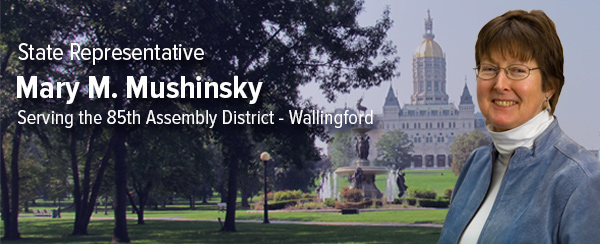
December 28, 2008
MUSHINSKY WARMS UP TO POTENTIAL OF NEW CHAIRMANSHIP
By Amanda Falcone, Record-Journal staff
With Connecticut facing difficult budget decisions, state Rep. Mary M. Mushinsky believes it's a perfect time for change, and the Wallingford Democrat is in a prime position to push for it.
Mushinsky was recently appointed House chairwoman of the Program Review and Investigations Committee by incoming House Speaker Christopher G. Donovan, D-Meriden. The committee's goals are to determine whether programs are effective and are being conducted efficiently and effectively and to suggest whether they should be modified or eliminated. Committee members are aided by a full-time staff.
While the committee itself does not submit legislation, it is required to submit annual reports, which include recommendations, to the General Assembly.
It is an important committee that helps provide ideas for legislation, Donovan said, adding that lawmakers regularly review facets of government. During hard financial times, scrutinizing programs is even more crucial, he said.
Mushinsky elaborated, stressing that during tough times, lawmakers are obligated to weed out programs that are not producing results. She hopes her committee will find a way to get all state agencies to use results-based accountability when they produce reports. Results-based accountability details progress and success or failure, she said, adding that she already is studying results-based accountability with an Appropriations Committee subcommittee.
When it comes to results-based accountability, Mushinsky looks to New York Mayor Michael R. Bloomberg as a role model. She and a few other lawmakers once met with Bloomberg's staff to see his methodical way of analyzing data, she said.
"All of us on our little field trip were pretty impressed," Mushinsky said.
Mushinsky, who was first elected in 1980, was appointed to the Program Review and Investigations Committee in 2007 by outgoing Speaker James A. Amann, D-Milford. The appointment came as a surprise to Mushinsky, but she said she now believes Amann was right in naming her to the committee.
"It's a good fit," she said. "I like to do the big, systemic reform."
And as the 2009 session of the General Assembly approaches, reform is on Mushinsky's mind.
The state does not have one department solely responsible for planning, Mushinsky said. With plenty of possible areas to study, she said, she has to remember that her committee cannot tackle everything.
She has identified at least one area in which she hopes to make a difference. The state should devise a way to link education and future job growth in Connecticut, she said, with a systemic way to train people for work.
"That one, I've already decided to do," Mushinsky said.
Mushinsky's colleagues - Democrats and Republicans - say they think Mushinsky will do a great job as chairwoman.
"She brings years of (legislative experience) and a good, keen mind," Donovan said.
Much like the previous chairwoman, retiring Rep. Julia B. Wasserman, R-Newtown, Mushinsky is likely to approach her new position methodically, in a scientific way that highlights research skills, said Sen. Anthony Guglielmo, R-Stafford Springs.
Guglielmo is a member of the committee and has some ideas of his own. For years, Guglielmo has said that the state should do a thorough review of its tax expenditures. With the state facing budget deficits, he is hoping that majority lawmakers will finally support his idea.
"This is a real opportunity," he said. "We've got to get back to the basics."
Connecticut spends nearly $5 billion on tax credits each year. There are credits for the film industry, car washes get a tax break, and there is also an exemption for boat owners looking to store their vessels for the winter.
Looking at tax exemptions is on Mushinsky's list of things for the Program Review and Investigations Committee to do, she says, adding that the Finance, Revenue and Bonding Committee may also be looking into the matter.
Taking a hard look at programs is good, but the committee must also consider looking into legislative practices, said Senate Minority Leader Pro Tem Leonard A. Fasano, R-North Haven. Fasano said he would like to see no legislative votes taken after 12:30 a.m., and lawmakers should have at least 24 hours to look at a budget bill before a vote is taken. There should also be no unfunded mandates for cities and towns, he said.
These are changes that Fasano does not believe will happen. Instead, the practices will likely become more entrenched, he said.
"The majority of Democrats don't have the stomach for it," Fasano said.
Mushinsky said Fasano's concerns are valid, but should be brought up on the first day of the legislative session, slated for Jan. 7. His concerns are rules issues, and the whole General Assembly votes on the rules, she said.
Regardless, like Mushinsky, Fasano is hoping that the Program Review and Investigations Committee will be active and produce suggestions that will lead to new legislation.
"Crisis is always the opportunity for change," he said.
© www.MyRecordJournal.com 2008